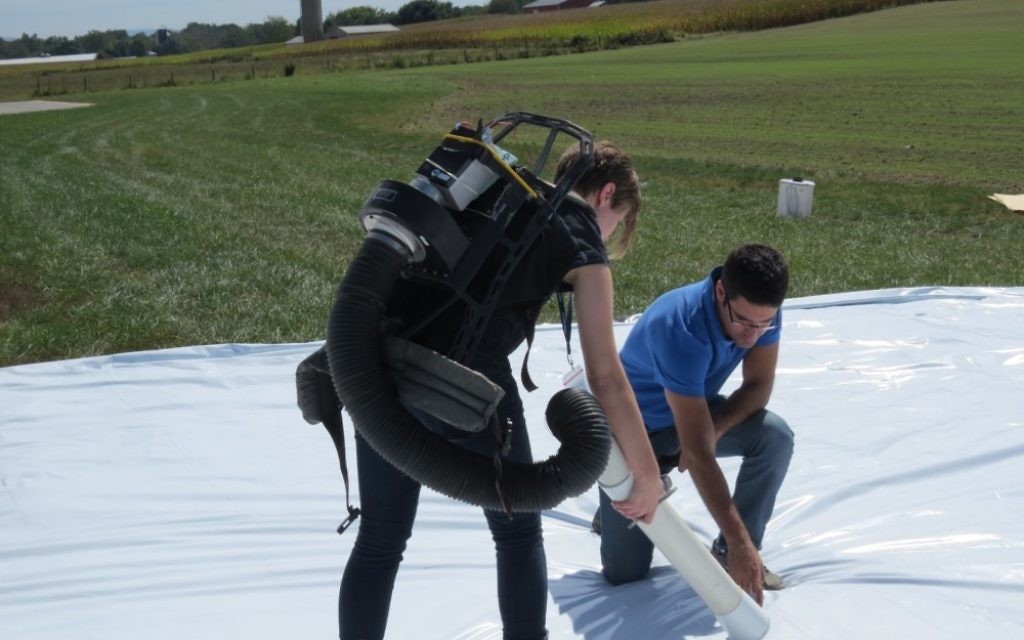Zika Mosquitoes Targeted From Air by Israelis

Physicians and scientists around the world are scrambling to understand and counteract Zika, but Israeli startup Senecio may have found the high-tech key to locking down the virus: an aerial attack on the mosquitoes that carry it.
“Mosquitoes are the biggest-killing animal of anything in the world” because of all the diseases they spread, from malaria to yellow fever to dengue to Zika, said Ralph Breslauer, a former Atlantan who is a board member of Senecio.

Other than malaria, he said, all of those diseases are carried by the same species of mosquito, Aedes aegypti, which isn’t native to most of the countries it threatens, including Brazil and the United States.
Get The AJT Newsletter by email and never miss our top stories Free Sign Up
But those mosquitoes are hard to eradicate because they develop resistance to chemical treatments. In Brazil, where Zika has caused a surge in microcephaly among babies and has scared many athletes away from the Olympic Games starting in Rio on Aug. 5, all the anti-mosquito chemicals are useless, Breslauer said.
An approach that gets around chemical immunity and prevents collateral damage to insects such as butterflies and bees is called a sterile insect technique: the introduction of sterile males into the environment to compete with fertile males for breeding.
“The beauty of a sterile mosquito is the male mosquito only has one job in life. It’s like a smart bomb,” Breslauer said, noting that the male mosquitoes don’t even bite.
The mosquito lifecycle is two to three weeks, with each female laying 100 to 200 eggs, Breslauer said. A concentrated application of 10 to 100 sterile males for every regular male once or twice a week during the breeding season results in a meaningful reduction in the population within a month.
There’s a big problem, though: Unlike sturdier insects such as fruit flies, mosquitoes have always been too delicate to survive being released from an airplane; the wind speeds rip them apart. And you can’t efficiently spread hundreds of thousands or millions of mosquitoes from the ground.
Senecio and its American partner, Virginia-based Dynamic Aviation, in September demonstrated a breakthrough technology that enables the release of massive numbers of sterile mosquitoes from an airplane.
That test came five months after the two companies began working together. Their partnership won a grant from the BIRD Foundation.
“It has been great working with Dynamic Aviation,” Senecio CEO Hanan Lepek said in an announcement of the successful September test. “Working together on the BIRD project has been a great exercise in cooperation and communication between the two companies and between our two countries, and we are looking forward to continuing the success.”
Dynamic Aviation provides the flying experience with sterile insect releases, while Senecio brings the technology to store the mosquitoes and to release them into slower air with constant acceleration, Breslauer said. The solutions have earned five patents.
For the storage problem — loading and releasing millions of mosquitoes at a time — the answer involved chilling the containers to slow the mosquitoes and designing a modular system that can scale up to deliver as many as 14 million insects per flight.
The release issue just required some Israeli aeronautical engineering and mathematical modeling, Breslauer said. “It really was a very specific aeronautical design of the pod we attached under the aircraft.”
Senecio doesn’t breed the mosquitoes; other companies do that. Instead, the Israeli startup wants to be the industry standard for distributing sterile mosquitoes, either by contracting directly (with Dynamic Aviation as its partner) or by licensing its technologies.
Senecio has two contracts, one in South America and one in Africa, to demonstrate in September what it can do with the second generation of its technology, which has the capacity for 6 million to 7 million mosquitoes per flight, Breslauer said. By the end of the year, that number will exceed 10 million.
Lepek said some countries are spending more than $1 billion a year on mosquito eradication, so the potential market for Senecio is big.
Senecio aims to make the cost of dropping sterile mosquitoes the same as the cost of chemical spraying. Breslauer said a citywide operation could cost millions of dollars, but most of the expense is for setting up a lab and producing the mosquitoes. Senecio’s share is 10 percent to 15 percent of the project cost.
Breslauer, who moved into the business of killing mosquitoes after investing in Israeli companies saving bees, said he’s concerned that the United States isn’t taking Zika seriously enough, especially as climate change allows Aedes aegypti to spread farther north.
The Centers for Disease Control and Prevention announced July 21 that it’s making $60 million in Zika grants available, but while mosquito control is eligible for awards, most of that money will go toward monitoring, lab capacity and epidemiological research.
The Obama administration has not gotten congressional approval for a request for $1.9 billion to fight Zika, including vaccine research and mosquito eradication.
“Don’t wait until this thing” gets out of control, Breslauer said. “Let’s get something done in advance here.”





comments